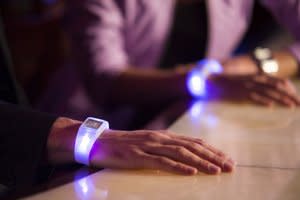Fashionistas May Be Flocking to Tech
News that Apple (AAPL) has hired Paul Deneve, the former head of fashion house Yves Saint Laurent, to work on unspecified “special projects” sent tongues wagging across the tech industry this week.


But the move makes perfect sense as Apple, Google (GOOG) and others gear up to introduce all manner of wearable computing devices, from watches and wristbands to glasses and earrings.
It takes some industrial design smarts and a bit of knowledge of consumer tastes to build an appealing laptop. But high-end fashion accessories? That’s a whole new level of cool.
Google is rumored to be partnering with hip online eyeglass maker Warby Parker to spiff up its Google Glass frames. Initial reaction to Glass ranged from “cheesy” to “nothing if not ugly.” "Saturday Night Live" even took a shot with a head-jerking parody review by Fred Armisen.
“How you design a laptop is probably not at all how you would go about designing a pair of connected glasses or a wristwatch,” says Ben Arnold, an analyst at NPD who is following the wearable computing trend. “Things that you wear as a fashion accessory have to look good.”
The "iWatch" trademark
Apple has yet to officially introduce a wristwatch product but the company made filings around the world last month to trademark the term “iWatch.” Apple has a team of 100 product designers working on a watch that could be introduced by the end of the year, Bloomberg reported.
Perhaps not surprisingly, Apple CEO Tim Cook has spoken positively about watch-like devices but less glowingly about glasses-based products. “I think the wrist is interesting,” Cook said at the D11 conference in May. “The wrist is natural.”
The appeal of entering the $6 billion global watch market may lie less in the volume of sales and more in the fat profit margins – about 60% and above at the high end.
Others getting into the space include Sony (SNE), which recently announced the second generation of its smart watch offering, the aptly named SmartWatch 2, which connects to Android phones and incorporates an NFC chip for wireless connections. Korean phone maker LG is rumored to have its own watch and glasses products under development. And many smaller companies are already selling products, such as the Jawbone's Up band used to monitor exercising and the Pebble smart watch, which works in connection with iOS and Android devices.
Rings, pendants, belts, footwear, tattoos
Future products will likely go beyond watches and glasses to include rings, pendants, belts, garments, footwear, patches and even tattoos, according to Mike Liebhold, senior researcher at the Institute for The Future and a veteran of tech stalwarts Apple, Netscape and Intel (INTC).
But beware as companies introduce first-, second-, even third-generation wearable computing devices – it could take years for function and design to merge seamlessly, Liebhold says.
“Fashion and function are clearly ephemeral,” he says. “Styles and uses will shift rapidly. So successful creators of wearable devices will need to stay completely agile, designing for fast shifts.”
Fashion items also come in many more varieties of colors and sizes than the typical tech item, creating a challenge for companies used to offering a choice of just black and white.
Getting personal
Consumers spend billions to make their tech gadgets more personal, says Tim Chang, a venture capitalist with the Mayfield fund. Cases and skins for phones and computers make up a billion dollar a year business, while ring tones generate sales upwards of $3 billion.
A watch or other wearable device "not only has to be cool to wear and show off to others, it’ll have to be personalizable to stand-out from the same device that others are also wearing," Chang says. "It’s not enough to just offer the same product in black, white, pink or clear anymore."
Not every tech company needs to hire its own cadre of luxury brand experts, though. Partnerships may be a better route.
“You could partner with Louis Vuitton, which lends more credibility to the design itself and also adds an element of buzz,” says NPD’s Arnold. “We’ll definitely be seeing that.”
Based on prior experience, Apple is most likely to create devices with enduring fashion appeal, Liebhold says. Google tends to iterate and experiment, issuing as many duds as hits.
And that could provide plenty of fodder for "Saturday Night Live" skits for years to come.
To keep up with all the latest news in tech, follow Aaron Pressman on Twitter and Tumblr.
